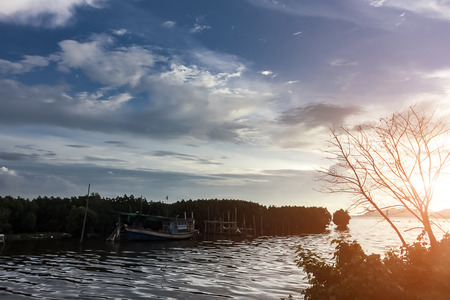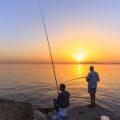1. Understanding the British Night Fishing Experience
Night fishing in the UK is a rite of passage for many anglers, offering not only the thrill of the catch but also a genuine connection with nature under a blanket of stars. However, this pastime comes with its own set of unique challenges, especially when it comes to coping with Britain’s notorious weather. The combination of frequent dampness, chilly breezes rolling off the water, and the ever-present threat of rain makes every outing unpredictable. Unlike fishing trips in sunnier climes, British night anglers must prepare for an environment where temperatures can drop quickly after dusk and sudden showers can turn a peaceful session into a test of endurance. To truly enjoy night fishing here, one must embrace both the serenity and the struggle—balancing relaxation with readiness as you wait for that elusive bite amidst moody mists and shifting winds.
2. Recognising Signs of Tiredness and Hypothermia
Night fishing in the unpredictable British climate comes with its own set of challenges, from mist rolling across the riverbanks to a sudden gust sweeping over open lakes. It’s crucial to keep an eye out for early signs of tiredness and hypothermia to ensure a safe and enjoyable angling experience. Fatigue can creep up on you during those long, chilly hours by the water, especially after midnight when concentration dips and reaction times slow. Common symptoms include frequent yawning, heavy eyelids, clumsy movements, or finding yourself repeatedly checking your bait without remembering why. These lapses are not just minor inconveniences; they can impact your ability to handle tackle safely or respond quickly to changing conditions.
Hypothermia is another risk that’s all too familiar for British anglers, thanks to our famously changeable weather. Early signs often begin subtly—shivering, numb fingers, feeling unusually cold or sluggish even in layers of clothing. As the temperature drops or a thick fog rolls in from the moors or coastline, these symptoms can worsen rapidly. Keep an ear out for slurred speech among mates or notice if someone seems confused about basic tasks; these could indicate advancing hypothermia. Sudden winds off a reservoir or a damp mist settling in can accelerate heat loss, so always be alert to environmental changes as much as your own physical state.
| Warning Sign | Fatigue | Hypothermia |
|---|---|---|
| Physical symptoms | Yawning, drooping eyelids, slower reactions | Shivering, numbness, blue lips/fingers |
| Mental symptoms | Poor concentration, forgetfulness | Confusion, disorientation, mumbling |
| Behavioural clues | Irritability, lack of motivation | Lack of coordination, stumbling |
| Weather triggers (UK-specific) | Misty conditions reducing visibility and alertness | Sudden temperature drops, wet winds off lakes/rivers |
If you notice any of these signs—whether in yourself or your fishing companions—it’s time to act promptly. Simple steps like warming up with a flask of tea or adding an extra thermal layer can make all the difference before things escalate. Staying vigilant is part and parcel of enjoying those peaceful nights on Britain’s waters safely.

3. Choosing the Right Gear for British Conditions
When night fishing in the unpredictable British weather, having the correct gear is absolutely essential for staying warm, dry, and safe. The UK climate is notorious for its sudden downpours, biting winds, and chilly nights—even in summer—so investing in reliable equipment is a must. Start with quality waterproofs: a sturdy jacket and trousers from trusted local brands like Barbour or Vass will help you keep the rain at bay. Pair these with a thermal base layer and fleece mid-layer to trap warmth without bulk; look for products by Rab or Montane, both known for their performance in damp, cold conditions. For sleeping, opt for an insulated sleeping bag rated for low temperatures—Snugpak’s UK-made bags are popular among anglers—and don’t forget a waterproof bivvy or shelter to shield you from wind and drizzle. A bivvy with a storm peak and heavy-duty groundsheet can make all the difference on exposed banks. Lastly, pack some thick wool socks and a beanie to prevent heat loss through your extremities; British-made options like Bridgedale socks are ideal. By choosing clothing and kit specifically designed for our unique weather, you’ll be far better equipped to tackle tiredness and stave off hypothermia during those long, rewarding nights by the water.
4. Warming Up: Food and Hot Drinks Tips
When the chill of a British night bites during your fishing adventure, nothing beats classic comfort food and a hot drink to keep spirits high and hypothermia at bay. Packing the right snacks and drinks isn’t just about taste—its essential for maintaining energy and body heat throughout the night.
Classic British Comfort Foods
Sticking to hearty, warming fare is a must. Here’s a selection of British favourites that are easy to prep in advance or heat up on the bank:
| Food | Why Its Great for Night Fishing |
|---|---|
| Sausage Rolls | Handy, filling, and delicious hot or cold. They provide protein and fat for slow-release energy. |
| Cornish Pasties | A meal in a pastry! These keep well and are packed with carbs and meat, perfect for staving off hunger. |
| Baked Beans & Toast (in a flask) | Rich in fibre and warmth, beans offer comfort and energy; keep warm in an insulated food flask. |
| Pork Pies | No fuss eating; sturdy enough for outdoor conditions and satisfying in chilly weather. |
| Oatcakes with Cheese | A traditional nibble thats easy to carry and provides both carbs and protein. |
Hot Beverages to Keep You Toasty
Nothing soothes like a steaming mug when you’re by the water’s edge. Consider these classic choices:
| Beverage | Perks for Cold Nights |
|---|---|
| Builder’s Tea | The ultimate British staple—strong, milky tea that warms you from the inside out. |
| Hot Chocolate | Sweet, comforting, and with a dash of marshmallows or cream, it feels like a treat under the stars. |
| Coffee (Thermos-brewed) | Keeps you alert as well as warm—a real lifesaver during long sessions. |
| Mug of Soup (Tomato or Chicken) | Hearty and hydrating, savoury soups restore warmth quickly after exposure to wind or rain. |
| Lemon & Ginger Herbal Tea | Caffeine-free but invigorating, this brew can help settle your stomach if you’re feeling queasy from cold. |
Packing Tips for Maximum Warmth & Convenience
- Invest in quality thermal flasks—they’ll keep food piping hot till dawn.
- Pack snacks in easy-to-open containers—cold fingers won’t manage fiddly packaging!
- Bring extra mugs; sharing a brew is part of the camaraderie of night fishing in Britain.
Final Word on Keeping Warm at Night by the Waters Edge
Embracing traditional British comfort food and heart-warming drinks not only keeps your energy up during those chilly nights but also adds an unmistakable local flavour to your angling adventure. With smart preparation, you’ll find yourself looking forward to every break between casts—no matter how nippy it gets!
5. Rest and Rotas: Managing Sleep During an Overnight Session
Night fishing in the unpredictable British weather can test even the most seasoned angler, especially when it comes to managing tiredness. Staying alert through the small hours is vital, not only for your catch rate but also for your safety—so getting your rest strategy right is a must. Many British anglers swear by a rota system, sharing watch duties amongst mates to ensure someone is always on hand to monitor the rods and keep an eye out for any weather changes.
One tried-and-true approach is setting up a simple shift schedule. If you’re fishing with a friend or in a small group, divide the night into manageable blocks—say, two-hour shifts. This allows each person to grab some shut-eye while knowing the gear (and kettle) are in safe hands. It’s a tradition on many British waters to draw straws or flip a coin for first watch—just make sure everyone gets their fair share of rest!
If you’re solo, napping becomes an essential skill. Experienced British anglers often recommend power naps of 20–30 minutes between bait checks or during quieter spells. A reliable bivvy alarm set at just the right volume ensures you won’t miss any action but can still drift off without worry. Don’t forget a good quality sleeping bag rated for UK conditions—there’s nothing worse than shivering through your kip.
Another local tip is to layer up before heading to bed—even if you feel warm after setting up camp, temperatures can drop sharply overnight on lakesides and riverbanks across Britain. Keep your boots within reach for swift exits if you get a bite or need to check on things outside.
Finally, don’t underestimate the value of a proper brew before settling down! A hot cup of tea or coffee has long been part of British night fishing culture, helping to stave off the chill and boost morale during those late-night watches. By working together, sticking to a fair rota, and making use of proven rest tactics, you’ll find yourself better equipped to tackle both tiredness and hypothermia—making your overnight session safer and far more enjoyable.
6. When Things Go Wrong: Emergency Measures
Even the best-prepared anglers can encounter trouble during a chilly British night by the water. If tiredness becomes overwhelming or the early signs of hypothermia appear, it’s crucial to know what steps to take and how to seek help efficiently.
Recognising the Warning Signs
Tiredness often creeps up gradually, marked by poor concentration, clumsy movements, or irritability. Hypothermia, on the other hand, may start with shivering and numb fingers before progressing to confusion, slurred speech, and even unconsciousness. Never ignore these signals—swift action is essential.
Immediate Actions for Tiredness
- If you feel excessively fatigued, stop fishing immediately. Rest somewhere dry and sheltered, ideally in your car if you’re parked nearby.
- Rehydrate with warm fluids from a flask and have a light snack—energy bars or sandwiches are ideal.
- If you’re feeling drowsy behind the wheel after packing up, don’t risk driving. Call a friend or use public transport if available.
Tackling Hypothermia on the Bank
- Move out of the wind and rain; seek shelter in your bivvy or car if possible.
- Remove wet clothing and change into dry layers immediately.
- Wrap yourself in blankets or an emergency foil blanket if you have one.
- Sip warm (not hot) drinks slowly—avoid alcohol as it worsens hypothermia.
Contacting Local Emergency Services
If symptoms worsen—such as persistent shivering, confusion, or difficulty speaking—ring 999 straight away and ask for medical assistance. Provide your exact location; using apps like What3words can be invaluable for pinpointing rural or waterside spots. The NHS recommends keeping your phone fully charged and carrying a power bank for emergencies. Local angling clubs also often have safety contacts—don’t hesitate to reach out if needed.
British Best Practices
The Environment Agency and RNLI advise always letting someone know where you’ll be fishing and when you plan to return. Carry a basic first aid kit, keep emergency numbers saved in your phone, and familiarise yourself with local signage indicating emergency access points along rivers and lakes. Remember: prevention is best, but knowing these emergency measures ensures you can enjoy night fishing across Britain’s wild waters with confidence and peace of mind.


